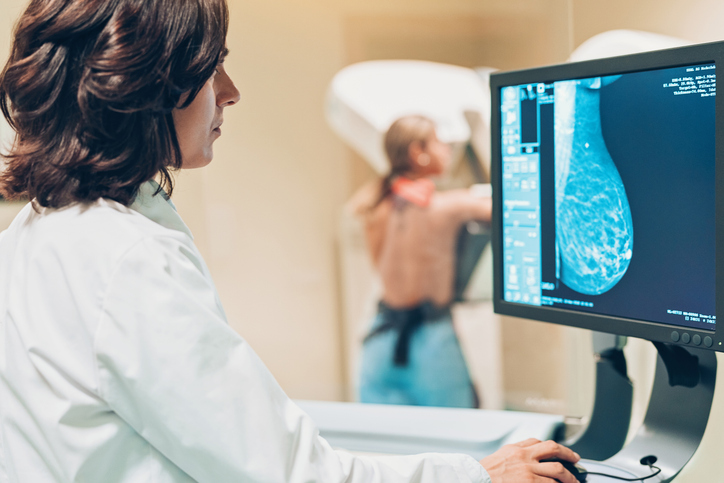Breast Cancer
Early detection is key
Adapted from BCNA Fact Sheet by Gold Coast Private Breast Surgeon Dr Maree Kekeff
 Breast cancer is the most common cancer affecting women today but survival rates are among the best in the world, with a 100% five-year survival rate for Stage 1 patients, and 95% for those with Stage 2.
Breast cancer is the most common cancer affecting women today but survival rates are among the best in the world, with a 100% five-year survival rate for Stage 1 patients, and 95% for those with Stage 2.
Regular screening and early detection is more important than ever.
We spoke to Gold Coast Private Breast Surgeon Dr Maree Kekeff to find out what you need to know about breast cancer, who’s at risk and how Australia’s world-class screening program is saving lives.
The Stats
- 1 in 7 women in Australia will be diagnosed with breast cancer by the age of 85.
- More than 20,000 new cases are diagnosed each year.
- 1 in 500 men will also be diagnosed with breast cancer.
- Every day, three women under the age of 40 are diagnosed — that’s around 1,000 younger women each year.
Understanding the Risks
Most breast cancers are diagnosed in women over 50, but it’s crucial for women of all ages to be aware of their breast health.
Some risk factors are beyond our control. These include:
- Age – the risk increases as we get older.
- Sex – breast cancer is far more common in women, though men can be affected.
- Family history – having a close relative with breast cancer increases your risk.
- Genetic mutations, such as BRCA1 and BRCA2.
Other risk factors are considered modifiable, or ‘lifestyle risks’, meaning we can take steps to reduce them. These include:
- Obesity
- Smoking
- Excessive alcohol consumption
- Sedentary lifestyle
A healthy lifestyle doesn’t eliminate the risk, but it does help lower it. Maintaining a healthy weight, staying active, quitting smoking and reducing alcohol intake are all positive steps.
Screening Saves Lives
Australia is fortunate to have one of the best breast cancer screening programs in the world. BreastScreen Australia provides free mammograms every two years for women aged 40 and over.
Here’s how it works:
- Ages 50 to 74 - you’ll receive an invitation every two years to participate in free screening.
- Ages 40 to 49 and 75+ - free screening is still available — you just need to book it, as you won’t receive an automatic invitation.
- High-risk individuals (such as those with BRCA gene mutations) - annual mammograms and MRIs are recommended starting at age 30.
If you're unsure about your risk level or eligibility, talk to your GP.
Know the Symptoms
Early breast cancer can be insidious and often doesn’t cause any symptoms, which is why regular screening is so important. But there are signs to look out for:
- A new lump or thickening in the breast or underarm area
- Changes in breast shape or size
- Skin dimpling or puckering
- Changes to the nipple, including discharge or inversion
- Persistent breast pain or swelling
- Lumps in the armpit (axilla)
If you notice any of these symptoms, see your GP as soon as possible. A delay can mean the difference between an 81% five-year survival rate (Stage 3) and 32% (Stage 4).
Diagnosis and What Happens Next
If a GP suspects breast cancer, they will usually start a triple assessment, which includes:
- Clinical examination
- Imaging (such as mammogram and ultrasound)
- Biopsy (ideally a core biopsy)
Any new palpable lump — even if it's small — should be investigated. GPs can arrange the necessary tests and refer you to a specialist if anything concerning is found.
Breast Cancer Management
If breast cancer is confirmed, the next step is developing a treatment plan that’s tailored to the individual, taking into account the type of cancer, how far it’s progressed and where it’s located.
Surgery may be required, depending on the tumour’s size and spread. Patients may be offered either a lumpectomy, which removes the cancer while conserving as much of the breast as possible, or a mastectomy, which removes the entire breast.
Today, just as screening is evolving, so are surgical approaches, with many patients benefitting from modern reconstructive techniques that focus on both aesthetics and function.
Some surgeons, including Dr Kekeff, offer breast reconstruction using perforator flaps — an advanced method where the breast is re-shaped using the patient’s own nearby tissue (usually fat and skin), without sacrificing muscle. This not only supports a natural look and feel but also minimises physical impact and preserves muscle strength.
Beyond surgery, treatment may involve a personalised combination of radiation therapy, chemotherapy, hormone-blocking medication or targeted therapies designed to suit the patient’s unique diagnosis and health needs.
How We Help
We understand a breast cancer diagnosis, at any stage, can feel overwhelming. We are here to help alleviate some of the anxiety and ensure you feel safe and supported every step of the way.
Gold Coast Private Hospital offers a multidisciplinary team of breast surgeons, oncologists, haematologists, psychologists, radiologists, allied health and breast care nurses to ensure you receive quality, coordinated care with the convenience of a single location.
For more information visit our website main page
